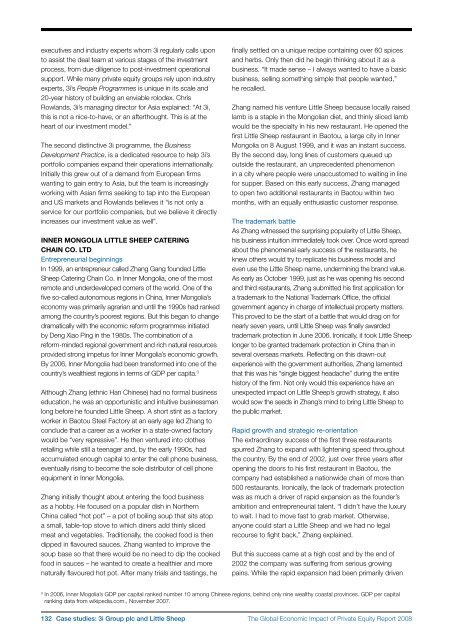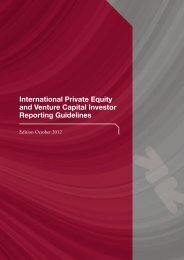executives and industry experts whom 3i regularly calls uponto assist the deal team at various stages <strong>of</strong> the investmentprocess, from due diligence to post‐investment operationalsupport. While many private equity groups rely upon industryexperts, 3i’s People Programmes is unique in its scale and20‐year history <strong>of</strong> building an enviable rolodex. ChrisRowlands, 3i’s managing director for Asia explained: “At 3i,this is not a nice‐to‐have, or an afterthought. This is at theheart <strong>of</strong> our investment model.”<strong>The</strong> second distinctive 3i programme, the BusinessDevelopment Practice, is a dedicated resource to help 3i’sportfolio companies expand their operations internationally.Initially this grew out <strong>of</strong> a demand from European firmswanting to gain entry to Asia, but the team is increasinglyworking with Asian firms seeking to tap into the Europeanand US markets and Rowlands believes it “is not only aservice for our portfolio companies, but we believe it directlyincreases our investment value as well”.Inner Mongolia Little Sheep CateringChain Co. LtdEntrepreneurial beginningsIn 1999, an entrepreneur called Zhang Gang founded LittleSheep Catering Chain Co. in Inner Mongolia, one <strong>of</strong> the mostremote and underdeveloped corners <strong>of</strong> the world. One <strong>of</strong> thefive so‐called autonomous regions in China, Inner Mongolia’seconomy was primarily agrarian and until the 1990s had rankedamong the country’s poorest regions. But this began to changedramatically with the economic reform programmes initiatedby Deng Xiao Ping in the 1980s. <strong>The</strong> combination <strong>of</strong> areform‐minded regional government and rich natural resourcesprovided strong impetus for Inner Mongolia’s economic growth.By 2006, Inner Mongolia had been transformed into one <strong>of</strong> thecountry’s wealthiest regions in terms <strong>of</strong> GDP per capita. 3Although Zhang (ethnic Han Chinese) had no formal businesseducation, he was an opportunistic and intuitive businessmanlong before he founded Little Sheep. A short stint as a factoryworker in Baotou Steel Factory at an early age led Zhang toconclude that a career as a worker in a state‐owned factorywould be “very repressive”. He then ventured into clothesretailing while still a teenager and, by the early 1990s, hadaccumulated enough capital to enter the cell phone business,eventually rising to become the sole distributor <strong>of</strong> cell phoneequipment in Inner Mongolia.Zhang initially thought about entering the food businessas a hobby. He focused on a popular dish in NorthernChina called “hot pot” – a pot <strong>of</strong> boiling soup that sits atopa small, table‐top stove to which diners add thinly slicedmeat and vegetables. Traditionally, the cooked food is thendipped in flavoured sauces. Zhang wanted to improve thesoup base so that there would be no need to dip the cookedfood in sauces – he wanted to create a healthier and morenaturally flavoured hot pot. After many trials and tastings, hefinally settled on a unique recipe containing over 60 spicesand herbs. Only then did he begin thinking about it as abusiness. “It made sense – I always wanted to have a basicbusiness, selling something simple that people wanted,”he recalled.Zhang named his venture Little Sheep because locally raisedlamb is a staple in the Mongolian diet, and thinly sliced lambwould be the specialty in his new restaurant. He opened thefirst Little Sheep restaurant in Baotou, a large city in InnerMongolia on 8 August 1999, and it was an instant success.By the second day, long lines <strong>of</strong> customers queued upoutside the restaurant, an unprecedented phenomenonin a city where people were unaccustomed to waiting in linefor supper. Based on this early success, Zhang managedto open two additional restaurants in Baotou within twomonths, with an equally enthusiastic customer response.<strong>The</strong> trademark battleAs Zhang witnessed the surprising popularity <strong>of</strong> Little Sheep,his business intuition immediately took over. Once word spreadabout the phenomenal early success <strong>of</strong> the restaurants, heknew others would try to replicate his business model andeven use the Little Sheep name, undermining the brand value.As early as October 1999, just as he was opening his secondand third restaurants, Zhang submitted his first application fora trademark to the National Trademark Office, the <strong>of</strong>ficialgovernment agency in charge <strong>of</strong> intellectual property matters.This proved to be the start <strong>of</strong> a battle that would drag on fornearly seven years, until Little Sheep was finally awardedtrademark protection in June 2006. Ironically, it took Little Sheeplonger to be granted trademark protection in China than inseveral overseas markets. Reflecting on this drawn‐outexperience with the government authorities, Zhang lamentedthat this was his “single biggest headache” during the entirehistory <strong>of</strong> the firm. Not only would this experience have anunexpected impact on Little Sheep’s growth strategy, it alsowould sow the seeds in Zhang’s mind to bring Little Sheep tothe public market.Rapid growth and strategic re‐orientation<strong>The</strong> extraordinary success <strong>of</strong> the first three restaurantsspurred Zhang to expand with lightening speed throughoutthe country. By the end <strong>of</strong> 2002, just over three years afteropening the doors to his first restaurant in Baotou, thecompany had established a nationwide chain <strong>of</strong> more than500 restaurants. Ironically, the lack <strong>of</strong> trademark protectionwas as much a driver <strong>of</strong> rapid expansion as the founder’sambition and entrepreneurial talent. “I didn’t have the luxuryto wait. I had to move fast to grab market. Otherwise,anyone could start a Little Sheep and we had no legalrecourse to fight back,” Zhang explained.But this success came at a high cost and by the end <strong>of</strong>2002 the company was suffering from serious growingpains. While the rapid expansion had been primarily driven3In 2006, Inner Mogolia’s GDP per capital ranked number 10 among Chinese regions, behind only nine wealthy coastal provinces. GDP per capitalranking data from wikipedia.com., November 2007.132 Case studies: 3i Group plc and Little Sheep<strong>The</strong> <strong>Global</strong> <strong>Economic</strong> <strong>Impact</strong> <strong>of</strong> <strong>Private</strong> <strong>Equity</strong> <strong>Report</strong> <strong>2008</strong>
y an aggressive franchise strategy, the company’s thinmanagement ranks resulted in very weak oversight <strong>of</strong> thefranchisees. <strong>The</strong> problems were aggravated when mediareports began to appear claiming substandard quality andservice in certain Little Sheep franchise stores, inevitablydamaging the brand.At the end <strong>of</strong> 2002, Zhang faced a critical decision: shouldthe company curtail growth and scale back the franchisesuntil his management team could be strengthened, eventhough this would result in the immediate loss <strong>of</strong> substantialfranchise fees? Moreover, he would risk alienating a growingroster <strong>of</strong> franchise applicants who were waiting to capitalizeon the brand and open Little Sheep restaurants. Resistingthe temptation to maximize short‐term pr<strong>of</strong>it, Zhang decidedto temporarily halt the awarding <strong>of</strong> new franchises in thefollowing year. In addition, he initiated efforts to more closelymonitor the performance <strong>of</strong> the existing franchises, anddesignated one <strong>of</strong> his long‐time lieutenants, Zhang Zhan Hai,to be in charge <strong>of</strong> the task.3i’s Investment in Little SheepManagement’s goalGradually, Zhang’s decision to scale back the expansionbegan to pay <strong>of</strong>f. In 2004 the company strengthened itsmanagement ranks significantly by hiring as senior vicepresident <strong>of</strong> finance, industry veteran Lu Wenbing, formervice president <strong>of</strong> Meng Niu (Mongolian Cow), a well‐knownInner Mongolia‐based dairy company. Lu brought muchneeded financial discipline and internal control to thecompany and by 2005 Little Sheep’s performance hadclearly rebounded as the company collected a number <strong>of</strong>prestigious regional and national business awards, includingthe Little Sheep brand being ranked 95th by the <strong>World</strong>Brand Lab among “<strong>The</strong> 500 Most Valuable Chinese Brands”.According to Ministry <strong>of</strong> Commerce statistics, the companyhad the second largest market share among China’srestaurants chains, behind only the fast‐food giant KFC.(See Exhibit 2 for a major‐events time line in Little Sheep’scorporate history up the 3i investment and Exhibit 3 for thecompany’s footprint in China at the end <strong>of</strong> 2005, just beforethe 3i investment.)Notwithstanding this renewed success, Zhang recognizedthat sustaining the company’s growth would require not onlyfinancial resources but, more importantly, additional industryexpertise. Like many Chinese entrepreneurs, Zhang cameto believe that the ultimate validation for Little Sheep’ssuccess would be a public listing, preferably on an overseasexchange. 4 This would give the company a diversified source<strong>of</strong> capital as well as brand recognition, and subject it tomarket discipline. His preference for an overseas listingwas rooted in his concern about the lax listing standardson the domestic Chinese exchanges; he preferred insteadan international certification. But to prepare for an IPO, hebelieved that the company needed to attract not onlyadditional capital, but a partner with the capability to providemuch needed industry knowledge and expertise. “Whatwe lacked were high-level pr<strong>of</strong>essionals from the food andbeverage industry who could help take Little Sheep to thenext, higher level... We needed a partner that could helpus prepare for an IPO outside China”, explained Zhang.Origin <strong>of</strong> the dealLittle Sheep’s extraordinary growth and brand namerecognition attracted many willing investors, includingsuch prestigious investment banks as Morgan Stanleyand Goldman Sachs. At 3i, Little Sheep was spotted byan associate director, Daizong Wang, a Wharton MBA whohad recently joined the group after a four‐year stint withGoldman Sachs in Hong Kong. As 3i’s investment strategyin Asia was becoming more sector-focused, Wang wasassigned to study the food and beverage sector, whichhad been growing at a rate twice as fast as China’s GDPfor over 15 years. As the Chinese economy began to shifttowards more consumption‐led growth, Wang believed thatconsumer‐related sectors such as restaurants would <strong>of</strong>fertremendous upside. (See Exhibit 4 for some growthstatistics <strong>of</strong> the Chinese restaurant sector.)Wang also noticed that even though the sector wasexperiencing rapid growth, prior to 2005 there had beenno private equity investments due to the lack <strong>of</strong> scale in typicalrestaurant businesses. Unfazed, he began to analyse themarket share rankings <strong>of</strong> restaurant chains in China to screenfor investment targets. Little Sheep ranked second, occupying6.2% <strong>of</strong> the entire restaurant and catering market, behindKFC. 5 Intrigued by Little Sheep’s ability to achieve scale unlikemost other restaurants, Wang realized that the key was thesimplicity <strong>of</strong> Little Sheep’s business model: “<strong>The</strong> Chineserestaurant business is fragmented because it is difficult tostandardize. In most restaurants the largest cost componentis the chef, but it is difficult to achieve consistency. Little Sheepis different because customers cook their own food in the hotpot, which eliminates the need for a chef. This do‐it‐yourselfstyle <strong>of</strong> dining and the ease <strong>of</strong> standardization made thisbusiness capable <strong>of</strong> scale.” In fact, these characteristicsmade hot pot restaurants a significant sub‐sector <strong>of</strong> thetotal restaurant industry, accounting for more than 20% <strong>of</strong>all consumer spending on restaurants, with Little Sheep theclear market leader with one third <strong>of</strong> total hot pot revenue.(See Exhibit 5 for statistics on the hot pot sub‐sector.) Basedon this analysis, Daizong Wang concluded, “From the verybeginning, I wanted to invest in this business.”His next step, in August 2005, was to cold call Little Sheep’ssenior vice president <strong>of</strong> finance, Lu Wen Bing. After makinghis pitch to Lu, whom Wang found “surprisingly open-minded[about private equity]”, he was invited to a formal meetingin Baotou, Little Sheep’s headquarters. Reflecting on theinitial exchange, Wang said: “At a time when few in Chinaunderstood the difference between private equity and4At the time, the Chinese A‐share market was also closed for new public listings.5According to Euromonitor, Little Sheep has a higher, 9.9% market share among China’s full‐service restaurant chains, excluding fast food.<strong>The</strong> <strong>Global</strong> <strong>Economic</strong> <strong>Impact</strong> <strong>of</strong> <strong>Private</strong> <strong>Equity</strong> <strong>Report</strong> <strong>2008</strong> Case studies: 3i Group plc and Little Sheep 133
- Page 2 and 3:
The Globalization of Alternative In
- Page 5:
ContributorsCo-editorsAnuradha Guru
- Page 9 and 10:
PrefaceKevin SteinbergChief Operati
- Page 11 and 12:
Letter on behalf of the Advisory Bo
- Page 13 and 14:
Executive summaryJosh lernerHarvard
- Page 15 and 16:
• Private equity-backed companies
- Page 17 and 18:
C. Indian casesThe two India cases,
- Page 19 and 20:
Part 1Large-sample studiesThe Globa
- Page 21 and 22:
The new demography of private equit
- Page 23 and 24:
among US publicly traded firms, it
- Page 25 and 26:
should be fairly complete. While th
- Page 27 and 28:
according to Moody’s (Hamilton et
- Page 29 and 30:
draining public markets of firms. I
- Page 31 and 32:
FIguresFigure 1A: LBO transactions
- Page 33 and 34:
TablesTable 1: Capital IQ 1980s cov
- Page 35 and 36:
Table 2: Magnitude and growth of LB
- Page 37 and 38:
Table 4: Exits of individual LBO tr
- Page 39 and 40:
Table 6: Determinants of exit succe
- Page 41 and 42:
Table 7: Ultimate staying power of
- Page 43 and 44:
Appendix 1: Imputed enterprise valu
- Page 45 and 46:
Private equity and long-run investm
- Page 47 and 48:
alternative names associated with t
- Page 49 and 50:
4. Finally, we explore whether firm
- Page 51 and 52:
When we estimate these regressions,
- Page 53 and 54:
cutting back on the number of filin
- Page 55 and 56:
Table 1: Summary statisticsPanel D:
- Page 57 and 58:
Table 4: Relative citation intensit
- Page 59 and 60:
figuresFigure 1: Number of private
- Page 61 and 62:
Private equity and employment*steve
- Page 63 and 64:
Especially when taken together, our
- Page 65 and 66:
centred on the transaction year ide
- Page 67 and 68:
and Vartia 1985.) Aggregate employm
- Page 69 and 70:
sectors. In Retail Trade, the cumul
- Page 71 and 72:
employment-weighted acquisition rat
- Page 73 and 74:
FIguresFigure 1: Matches of private
- Page 75 and 76:
Figure 6:Figure 6A: Comparison of n
- Page 77 and 78:
Figure 8:Figure 8A: Comparison of j
- Page 79 and 80:
Figure 11: Variation in impact in e
- Page 81 and 82:
Figure 12: Differences in impact on
- Page 83 and 84:
Private equity and corporate govern
- Page 85 and 86:
et al (2007) track the evolution of
- Page 87 and 88:
groups aim to improve firm performa
- Page 89 and 90:
distribution of the LBO sponsors, m
- Page 91 and 92:
the most difficult cases. This stor
- Page 93 and 94:
to see whether these changes of CEO
- Page 95 and 96:
Figure 3:This figure represents the
- Page 97 and 98:
TablesTable 1: Company size descrip
- Page 99 and 100: Table 5: Changes in the board size,
- Page 101 and 102: Table 7: Board turnoverPanel A: Siz
- Page 103 and 104: Part 2Case studiesThe Global Econom
- Page 105 and 106: European private equity cases: intr
- Page 107 and 108: Exhibit 1: Private equity fund size
- Page 109 and 110: Messer Griesheimann-kristin achleit
- Page 111 and 112: ealized it was not possible to grow
- Page 113 and 114: The deal with Allianz Capital partn
- Page 115 and 116: the deal, the private equity invest
- Page 117 and 118: Exhibit 1: The Messer Griesheim dea
- Page 119 and 120: Exhibit 5: Post buyout structureMes
- Page 121 and 122: New Lookann-kristin achleitnerTechn
- Page 123 and 124: feet. This restricted store space w
- Page 125 and 126: institutional investors why this in
- Page 127 and 128: Although a public listing did not a
- Page 129 and 130: Exhibit 5: Employment development a
- Page 131 and 132: Chinese private equity cases: intro
- Page 133 and 134: Hony Capital and China Glass Holdin
- Page 135 and 136: Hony’s Chinese name means ambitio
- Page 137 and 138: Establishing early agreement on pos
- Page 139 and 140: Executing the IPOEach of the initia
- Page 141 and 142: Exhibit 1A: Summary of Hony Capital
- Page 143 and 144: Exhibit 4: Members of the China Gla
- Page 145 and 146: Exhibit 6A: China Glass post‐acqu
- Page 147 and 148: Exhibit 8: China Glass stock price
- Page 149: 3i Group plc and Little Sheep*Lily
- Page 153 and 154: soul” of the business. But there
- Page 155 and 156: Exhibit 1: Summary information on 3
- Page 157 and 158: Exhibit 6: An excerpt from the 180-
- Page 159 and 160: Indian private equity cases: introd
- Page 161 and 162: ICICI Venture and Subhiksha *Lily F
- Page 163 and 164: investment,” recalled Deshpande.
- Page 165 and 166: 2005 - 2007: Moderator, protector a
- Page 167 and 168: Exhibit 3: Subhiksha’s board comp
- Page 169 and 170: Warburg Pincus and Bharti Tele‐Ve
- Page 171 and 172: founded two companies at this time
- Page 173 and 174: By 2003 this restructuring task was
- Page 175 and 176: Exhibit 1C: Private equity investme
- Page 177 and 178: Exhibit 4B: Bharti cellular footpri
- Page 179 and 180: Exhibit 6: Summary of Bharti’s fi
- Page 181 and 182: Exhibit 7: Bharti’s board structu
- Page 183 and 184: In the 1993‐94 academic year, he
- Page 185 and 186: consumer products. She was also a R
- Page 187 and 188: AcknowledgementsJosh LernerHarvard
- Page 189: The World Economic Forum is an inde















